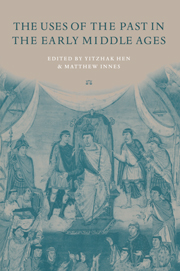Book contents
- Frontmatter
- Contents
- List of contributors
- Acknowledgements
- List of abbreviations
- Introduction: using the past, interpreting the present, influencing the future
- 1 Memory, identity and power in Lombard Italy
- 2 Memory and narrative in the cult of early Anglo-Saxon saints
- 3 The uses of the Old Testament in early medieval canon law: the Collectio Vetus Gallica and the Collectio Hibernensis
- 4 The transmission of tradition: Gregorian influence and innovation in eighth-century Italian monasticism
- 5 The world and its past as Christian allegory in the early Middle Ages
- 6 The Franks as the New Israel? Education for an identity from Pippin to Charlemagne
- 7 Political ideology in Carolingian historiography
- 8 The Annals of Metz and the Merovingian past
- 9 The empire as ecclesia: Hrabanus Maurus and biblical historia for rulers
- 10 Teutons or Trojans? The Carolingians and the Germanic Past
- 11 A man for all seasons: Pacificus of Verona and the creation of a local Carolingian past
- APPENDIX: The Memorial to Pacificus of Verona
- Index
7 - Political ideology in Carolingian historiography
Published online by Cambridge University Press: 14 August 2009
- Frontmatter
- Contents
- List of contributors
- Acknowledgements
- List of abbreviations
- Introduction: using the past, interpreting the present, influencing the future
- 1 Memory, identity and power in Lombard Italy
- 2 Memory and narrative in the cult of early Anglo-Saxon saints
- 3 The uses of the Old Testament in early medieval canon law: the Collectio Vetus Gallica and the Collectio Hibernensis
- 4 The transmission of tradition: Gregorian influence and innovation in eighth-century Italian monasticism
- 5 The world and its past as Christian allegory in the early Middle Ages
- 6 The Franks as the New Israel? Education for an identity from Pippin to Charlemagne
- 7 Political ideology in Carolingian historiography
- 8 The Annals of Metz and the Merovingian past
- 9 The empire as ecclesia: Hrabanus Maurus and biblical historia for rulers
- 10 Teutons or Trojans? The Carolingians and the Germanic Past
- 11 A man for all seasons: Pacificus of Verona and the creation of a local Carolingian past
- APPENDIX: The Memorial to Pacificus of Verona
- Index
Summary
At the monastery of St Amand in the second half of the ninth century, a compilation of historical texts was prepared with a very particular agenda. The manuscript was in the cathedral library of Worms by the thirteenth century and survives in the Österreichische Nationalbibliothek in Vienna (lat. 473). It contains the following texts. First of all (fols. 1v–85v) there is the Liber Pontificalis. This is followed by the Liber Historiae Francorum (fols. 90r–107v), the Continuations to the Chronicle of Fredegar (fols. 108r–114) and the Annales Regni Francorum, in the ‘D’, that is, unrevised version (fols. 116–143v and 152v–169r). There is a portion of Einhard's Vita Karoli Magni (fols. 144r–151) and the manuscript concludes with a truncated version of the Genealogia Domus Carolingicae, divided into two sections: Genealogia Sancti Arnulfi and Historia Francorum Epitomata et Origine Gentis ad Ludovicum Pium (fols. 169v–172r).
This codex is among many such compilations of Frankish history produced in the ninth century all over the Frankish empire. The most common combinations of text include the Annales Regni Francorum and the Vita Karoli of Einhard, but we also find them juxtaposed with Continuations of Fredegar, the Liber Historiae Francorum, or the Lives of Louis the Pious by Thegan or the Astronomer. For any one of these compilations the pertinent questions relate to who compiled this volume, why the selection it contains was made, for whom, and for what purpose.
- Type
- Chapter
- Information
- The Uses of the Past in the Early Middle Ages , pp. 162 - 174Publisher: Cambridge University PressPrint publication year: 2000
- 5
- Cited by

